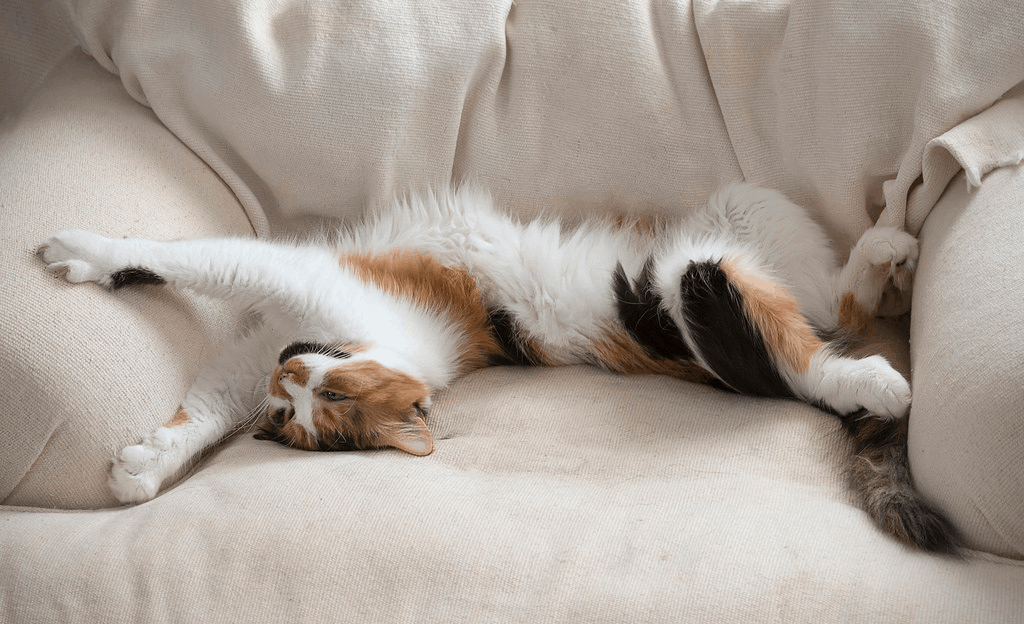
Just like humans, cats can be victims to negative feelings like anxiety, stress, and fear. When this happens, cats act out and behave strangely. Being in this state is very discomforting to a cat, so it’s best to watch out for the triggers, know the signs and act accordingly.

Table of Contents
Symptoms and Causes of Anxiety, Stress, and Fear
Some symptoms to look out for are your cat being withdrawn and hiding, being aggressive, excessive grooming and hair loss, loss of appetite, and any other abnormal behaviors that you notice.
A lot of things can happen that cause anxiety or stress in cats. The main events that trigger stress is a big change in their environment or something new that the cat needs to get used to. Below are some events to keep an eye on:
Environment Changes
Environmental changes are changes at home or in areas where the kitty spends most of their time. A major change at home can leave a cat worried about what is happening.
Moving
Moving can be stressful even for cats because they are going to a completely unknown environment. They are leaving their home behind where they felt safe. They are in an unknown territory without their scent.
Rearranging the House
Another change that can spark some anxiety is rearranging the house. If you’re switching bedrooms or getting a whole new living room set, that chaos can leave a kitty scared and confused.
Downsizing
You may not notice all the things inside your house, but your cat certainly does. They have explored every nook and cranny in every space they have been in. If you’re in the middle of downsizing a lot of items and furniture, you may give your cat some anxiety.
Change in Routine
Cats don’t like a lot of change and they get worried when things get disrupted.
A New Job or Employment Changes
Your cat loves you and observes you. If you suddenly get a job after being laid off, they could get separation anxiety since they’re so used to having you around. They will also get upset if you suddenly work the night shift and are not around at night anymore.
Guests Staying for a Long Period
If you’re having friends and family stay over for a few weeks, everyone’s routine gets interrupted because you have to adjust to other people being around. This affects your cat as well if they are not used to being around extra people.
Frequent Vet Visits
If your cat comes down with an illness that requires multiple trips to the vet to clear up, not only will the illness cause a behavior change but the constant caging and strangers will upset them even more. The last thing they want when they don’t feel good is to be poked and prodded!
Owner Leaving for Awhile
If you leave on vacation and have a pet sitter, this is a big change for them. They will have to get used to someone else while wondering where you went. Then when you come home, they have to get used to the old ways all over again.

Family Changes
As life would have it, your household can grow bigger with major life events. Your cat is there for the ride too. If you’re welcoming a baby into your life, this can give some anxiety to your cat. This ticks off a lot of boxes: new routine, strangers, and loud noises. Some cats will stiff a baby and mind their own business. Others will run away and hide.
Another major life change is getting married or moving in with a partner. This makes your cat need to get used to another person, their routines, and their stuff. If you’re moving in with your spouse/partner then your cat needs to get used to a new home which is anxiety-inducing.
Moving family in is another example of a major change that involves strangers, extra noises, disruption in routine, and rearranging the house.
Any Trips
Cats love being in their own territory where they feel safe and in control. Taking them outside of their environment can cause fear of the unknown. Trips also involve being caged. Confinement cause anxiety because they cannot escape or run to safety.
Trips to the vet can cause stress because not only are strangers going to be poking and prodding them, there are other animals nearby and a lot of confusing scents. Putting a blanket over the cage at the vet can give them some comfort so they don’t have to see the other animals.
If you have decided to take your cat on vacation with you, you can cause fear in them by leaving them alone in a strange, new hotel room for long periods of time. Their whole routine will be disrupted. Another option is to send them to a pet sitter. However, that raises problems as well.
It is always better to have a pet sitter come to your home and care for your cats in their territory. But if you have no choice, then be prepared to have a stressed out kitty, especially if the pet sitter has other animals in their house; your cat will not like entering someone else’s territory.
Other Symptoms
Here are some other things that cause your cat to get anxious, scared or stressed:
Unclean Litter Box
Cats like having a nice, clean litter box to do their business in. If it’s packed and dirty, they will get anxiety and find another spot to go to the bathroom. No one likes to go to the bathroom in a dirty place, so be sure to keep their litter clean because you may not like the other spot they choose to go.
Loud Noises
Thunderstorms, power tools, hair dryers, vacuum cleaners, beard trimmers and anything else that is super loud for a while can cause major stress. Your cat may freak out and become aloof for a long time after the noise goes away.
A Strange Animal
Any animal entering your cat’s territory might send your cat to attack mode. This is stress and fear bunched into a scary situation that can turn into a fight. Some cats are social in this regard, but a lot of the times cats are really territorial and the strange animal can cause them to act out.

How To Calm Them
After knowing a lot of situations that cause anxiety and stress, let’s talk about how to calm your kitty.
Comfort
Giving them a nice quiet space with familiar scents can give your cat a haven to de-stress. Their favorite toys and blankets can provide their scent and as well as familiarity. A good choice for this is a corner in your room or under the bed.
Petting and being with them can comfort them as well. They see you as their caregiver and know you are there for them. Giving them some pets is worth a shot. However, most cats want to work out their problems alone.
Give them Solitary
Going off the tips above with giving them a nice quiet space, another option is to turn that space into an area where they can be completely alone. A bathroom or a dark closet can come in handy when there is too much commotion in the main part of the home.
A lot of cats need to be completely alone or they’ll act out under stress. If you yourself can’t comfort them, put them in the solitary space until they’re okay. Some cats only need alone time to feel better and assess the situation.
Take them to the Vet
If the behavior and symptoms of stress last well beyond the stress-inducing incidents, or if there haven’t been any major life changes and the behavior is out-of-the-blue, then your cat may be facing an illness or injury. Take your cat to the vet to see what is going on.
Calming Treats
Your cat loves a good treat. And providing treats may act to comfort them in moments of stress, but there also medicated cat treats that reduce stress and anxiety. Ask your vet at your next visit about medicated treats. And only provide medications under the supervision of a veterinarian.
When to Step Back
Another example of a time where you need to calm your cat is when they have excessive energy. They gallop around, jump over everything and knock things over. During these moments, you are dealing with a bored kitty. Play with them. Give them toys and play laser light tag. Playing gives your cat a venue to put out their energy and get tired out.`
Calming your cat is as easy as giving them their space and giving them familiarity and comfort. When you start to see signs of anxiety, stress or fear, look around and try to assess what caused the stress. Once you discover the trigger, you can start to understand why they’re feeling upset and move towards calming them down.
Continue reading:
Benefits of Cats as Emotional Support Animals

